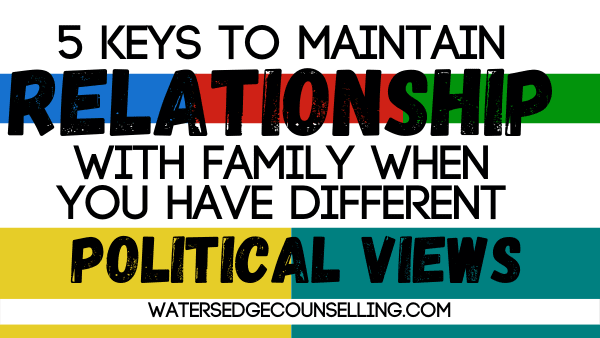
We have just held a national election in Australia, and while we celebrate our right to vote, there is no doubt it brings tensions to the surface. Our closest friends and some colleagues will often share similar points of view to us (largely because as adults we choose who we spend time with!), but we all know at least one person who has a radically different opinion…and they are loud about it. How we navigate that conflict and differences of opinion can determine if we have any sort of relationship with these people. And while it’s easy enough to block someone on social media if we don’t like what we see, it’s not that simple with family members or long-term friends who disagree about something we feel is crucial to our values or identity. So how can we maintain relationships with people when we disagree so profoundly, and should we? Here are five keys to help you make that decision.
- It is possible to have a relationship with people if they still acknowledge your identity, autonomy and power.
While they may vote differently to you, a family member who respects your point of view and the personal reasons you hold it, can stay in your life. The moment you feel unsafe or unable to be your true self around these people, you need to step back and set more appropriate boundaries. While this shouldn’t necessarily be your responsibility, you may need to draw the line for your own benefit.
- Some people don’t realise the cultural complexities of their point of view and how it impacts you.
That’s not to say they aren’t passionate about their political leanings that you fundamentally disagree with, but often we don’t fully comprehend the life experience that brings someone to such an extreme point of view. So while they may support a political party due to their passion for economics, the environment, access to health care, or religious freedoms, they may not realise that their overall support is interpreted by you to fundamentally infringe on your rights, your concerns, or your identity. In other words, they may not realise that their stance feels like a personal attack. That doesn’t give them a right to hurt or minimize you, but sometimes realising that people are ignorant to our inner world or other facets of culture helps us to find the humanity in them.
- Sharing our stories can build relationship
If both people are willing to open up and respect the other, then sharing our life experiences can bring context to our point of view. For instance, you could ask why they feel so passionately about a military stance, business or environmental impact. We come to these points of view through our own struggles, and our lived experiences. That’s why holding the opposing political view can be seen as a personal attack – because we feel like it invalidates our passion, pain and relationships. By learning how their job, their childhood, their sexuality, health or time on the frontline has molded their political point of view, you can validate the humanity in your friend and they can validate you, while still voting differently on the ballot. You may even find some common ground.
- Sometimes it’s better to avoid political conversations all together.
Sometimes the only way we can continue a relationship with a family member is to avoid certain topics all together. If bringing up certain issues is going to cause arguments, snark or bullying at Christmas lunch, then don’t bother. And if a certain family member likes to cause a stir, come up with a plan to deescalate the situation. Often, our siblings, cousins or other family members will feel the same way and are willing to work with us to change the conversation. The same goes for any political vitriol that is posted on social media: if you don’t feel able to block them, hide them from your timeline and choose to disengage completely. It’s not necessarily your responsibility to educate someone, or to feed their need for conflict.
- There are non-negotiables that are deal breakers in family relationships.
It is possible to have different opinions and still maintain a cordial and healthy relationship with other. But if they start speaking or acting in ways that breaches your non-negotiables, then you may need to cut ties with them as a last resort. Non negotiables aren’t preferences – they are basic parts of your humanity. Gender, sexuality, religion, race, living with integrity and decency – these are fundamental parts of who we are, and a family member who is unwilling to see you as an equal or who bullies or manipulates you, should not have a place in your life.
Are political differences causing rifts in your family? Do you feel victimized or bullied for holding a certain point of view? Contact Colleen on 0434 337 245 or Duncan on 0434 331 243 for a FREE 10-minute phone consultation on how we can best help you, or press book now.
Leave a Reply